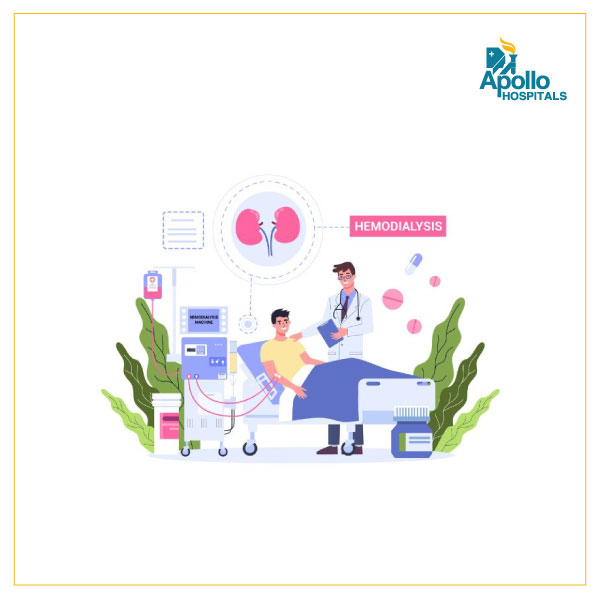How to take care of yourselves after dialysis?
- 5644 Views
- Apollo Hospital Mumbai
- June 9, 2023
- Health

What is kidney dialysis?
Dialysis or hemodialysis is a treatment for severe kidney failure, also known as end-stage kidney disease or renal failure. Dialysis is typically required when 90 percent or more of the renal function has been lost.
What happens in kidney failure? Why do you need dialysis or transplant?
- Renal function can be lost quickly (acute kidney damage) or gradually (chronic kidney disease) over months or years.
- When kidney function declines, fluid and waste products accumulate in the blood. Dialysis helps the kidneys, which are failing, get rid of waste and fluid.
- Your kidney function, as measured by blood and urine tests, health, nutritional status, symptoms, quality of life, individual preferences, and other factors influence when dialysis begins.
- Kidney transplant involves the insertion of a donor kidney in an individual to support the function of the existing kidney.
Dialysis should be started as soon as the kidney disease has reached a stage where life-threatening consequences are possible. Dialysis can be performed in a hospital, hospital clinic, or stand-alone clinic. Doctors, nurses, and technicians are involved in your care. Hemodialysis at the center takes three to five hours (an average of three and a half to four hours) and is performed three times a week. During treatment, you can read or sleep and usually have access to a television.
After-care for dialysis patients
The key to feeling better after dialysis treatment depends on what you do before and between dialysis treatments.
- Fluid restrictions: Adhering to your prescribed fluid restrictions is very important. If you gain more fluid than prescribed, you will need to remove more fluid during the prescribed dialysis time. This causes rapid fluid shifts in your body, leading to hypotension and fatigue.
- Diet: Your diet is also essential. You must follow the diet prescribed by the nutritionist/dietitian. Remember that your kidneys can no longer excrete food by-products, so the by-products will accumulate until your subsequent treatment. This can make you feel weak and tired.
- Medications: Take your medication as prescribed unless your healthcare provider tells you to alter the pre-dialysis dose.
- Appropriate disease management: Treating the condition that caused kidney failure is essential to maintain your health and well-being.
- Activity: It would be best if you incorporated some activities based on your tolerance. This will help you feel better over time.
You must continue to manage the disease that caused renal failure. Always remember to talk about your worries with your doctor and other healthcare team members! Before starting any medical regimen, talk to your doctor, nurse, or pharmacist to see if it is safe and effective. They can make your treatment experience and overall health better!
Facilities for kidney health at Apollo Hospitals Navi Mumbai
Apollo Hospitals Navi Mumbai offers a wide range of services for individuals with kidney disease.
- Health check packages for a comprehensive analysis of the kidneys.
- Dietician Consultation for a customised diet plan for kidney disease.
- Dialysis Units: Apollo Hospitals Navi Mumbai houses the most advanced Dialysis units with provision for Nocturnal Haemodialysis, Short daily Haemodialysis, Peritoneal Haemodialysis, and Paediatric Haemodialysis. We also provide Haemodialysis at the convenience of your home.
- Kidney transplant at Apollo Hospitals: The Centres of Nephrology and Urology here have a sizeable and comprehensive renal transplant program, having performed both living donor and cadaveric transplants. The Centres also perform minimally invasive surgery for renal donors thereby minimising post-operative recovery time and hospitalisation. The transplant team performs highly complicated transplants with a good success rate including ABO-incompatible (across blood groups) transplants in highly sensitised patients and paediatric kidney transplants.
Call 022 6280 6280 or visit Apollo Hospitals Navi Mumbai for any concerns regarding kidney dialysis.
- October 22, 2024
World Stroke Day: Raising Awareness and Saving Lives
- October 22, 2024
Robotic Surgery in Gynecology: A Revolution in Women’s Health
- October 22, 2024
Robotic Surgery in General Surgery
- October 22, 2024
Pediatric Neurosurgery: Complexities of Brain Tumors in Children
- October 22, 2024
LGBTQ+ and Cancer: Challenges and Support
- Bone Marrow Transplant3
- Cardiac sciences44
- Child Care7
- Clinical Excellence33
- Cosmetology2
- COVID-199
- Diseases4
- Emergency8
- Emergency10
- Endocrinology1
- ENT5
- Fetal Medicine1
- Gastroenterology6
- General Medicine9
- General Surgery3
- Genomic Medicine2
- Gynecology1
- Health14
- Hematology2
- Kidney Transplant5
- Kidney Transplant2
- Liver Transplant6
- Neonatology1
- Nephrology2
- Nephrology & transplant1
- Nephrology & Urology4
- Neurosciences1
- Neurosciences20
- Nutrition/Diet1
- Obstetrics & Gynecology9
- Obstetrics & Gynecology4
- Oncology92
- Oncology3
- Ophthalmology1
- Orthopedic13
- Patient Speak1
- Pediatric Surgery3
- physiotherapy2
- Psychologist2
- Pulmonology1
- Rheumatology1
- Robotic Suregry1
- Robotic Surgery11
- Spine1
- Uncategorized111
- Women Care5
